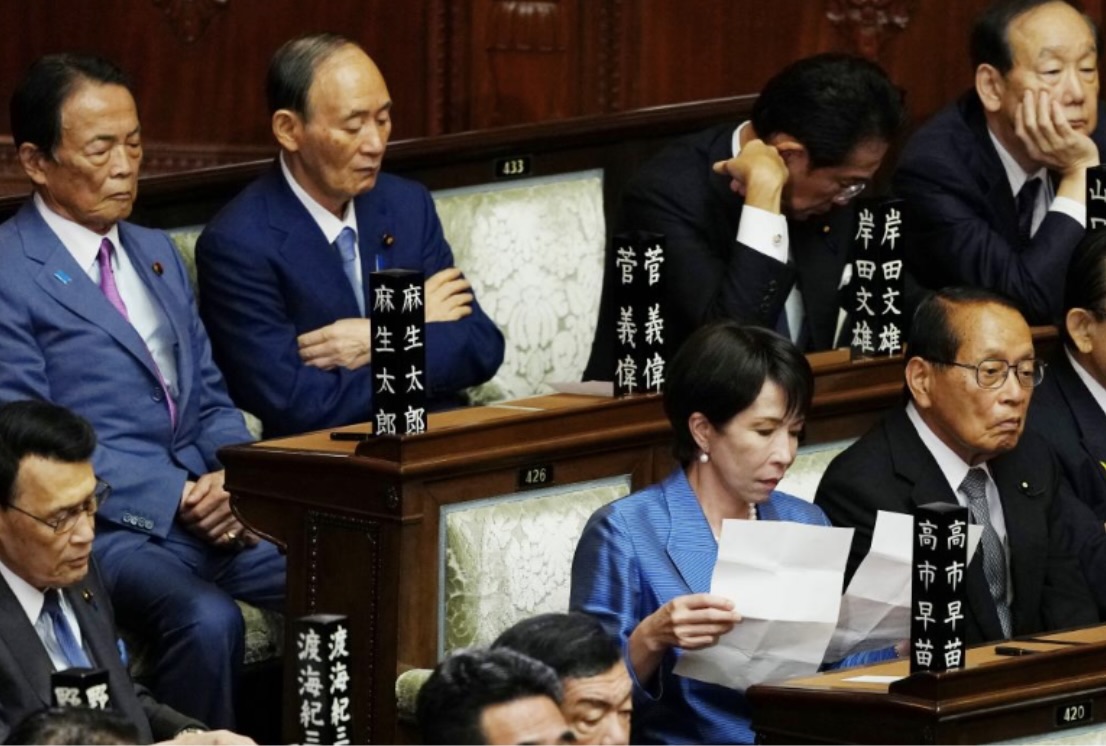Oct 25 (News On Japan) - At around 1:45 p.m. on October 21, Sanae Takaichi won a majority of 237 votes in a key vote in the House of Representatives (more than the 233 votes required for half), and was successfully elected as Prime Minister, becoming the first female Prime Minister in Japanese history.

However, after the collapse of the ruling coalition between the Liberal Democratic Party and New Komeito Party of Japan, Japan is faced with a complex situation of unbalanced internal economic development and a turbulent external development environment. It remains to be seen whether the new government of Sanae Takaichi can lead Japan out of the quagmire.
On the one hand, the breakup of the LDP-Komeito coalition created uncertainty for the new government of Sanae Takaichi. After her election as LDP president, her former governing ally, the Komeito Party, withdrew from the coalition due to dissatisfaction with the "black gold politics" issue. This left Sanae Takaichi in a precarious position of minority government. In desperation, she was forced to sign a coalition agreement with the Japan Innovation Party.
Compared with the ruling coalition between the Liberal Democratic Party and New Komeito Party of Japan, the new alliance between the LDP and Japan Innovation Party is actually a more fragile combination. Japan Innovation Party participates in the government in the form of "extra-cabinet cooperation". Its members do not enter the cabinet, and only sends the chairman of the Parliamentary Affairs Committee, Takashi Endo, as assistant to the prime minister. This form of governing cooperation undoubtedly reserves the space for the Japan Restoration Party to withdraw at any time. Once the differences between the two parties cannot be bridged, the ruling coalition is likely to collapse.
The two sides remain at odds over key policy areas, such as corporate and group political donations. The Yomiuri Shimbun noted that the Japan Innovation Party has been competing with the LDP in elections for years, particularly in Osaka's local council elections, where a sense of distance persists between the two parties. Meanwhile, since Sanae Takaichi has failed to secure a stable majority in the Diet, the new coalition will continue to face constraints from the opposition in drafting the 2025 supplementary budget and advancing controversial policies. The Associated Press believes this could make Sanae Takaichi's new government unstable and short-lived.
On the other hand, in the area of domestic economic development, Sanae Takaichi has previously advocated for expansionary fiscal policy, opposed the Bank of Japan's interest rate hikes, and called for increased fiscal spending to stimulate the economy. However, given Japan's current economic situation, the policy “Sanaenomics” is not only unlikely to be effective, but may also have a series of negative effects on Japan's domestic economic development.
Japan currently faces a serious debt problem, with government debt exceeding 200% of GDP. Continuing to implement expansionary fiscal policies will undoubtedly further increase the government's debt burden and heighten fiscal risks. Besides, expanding fiscal spending to stimulate the economy has proven to be limited in effectiveness over the past few decades. Following the bursting of its bubble economy, Japan implemented numerous large-scale fiscal stimulus measures, but the economy has consistently failed to achieve a true recovery.
Sanae Takaichi's opposition to the Bank of Japan's interest rate hikes is also problematic. The current global economic situation is complex and volatile, with inflationary pressures gradually increasing. If the Bank of Japan fails to adjust its interest rate policy in a timely manner in response to the economic situation, the yen will depreciate, further driving up the prices of imported goods and exacerbating domestic inflationary pressures. For a country as import-dependent as Japan, this will adversely impact people's lives. Sanae Takaichi's economic policies lack a thorough analysis and comprehensive consideration of the realities of the Japanese economy. It blindly pursues short-term economic growth while neglecting long-term economic stability and sustainable development.
Furthermore, in the diplomatic sphere, Sanae Takaichi's previous radical foreign policy advocacy has the potential to put Japan in a dangerous position. As a member of parliament and a cabinet minister, Sanae Takaichi was considered a representative figure of Japan's right-wing politicians. Her advocacy for revising the postwar pacifist constitution, the introduction of the latest weaponry, and the strengthening of long-range strike capabilities have severely hurt the feelings of the people of victimized Asian countries.
Japan has long had conflicts and disagreements with neighboring countries, over territorial disputes and historical issues. If Sanae Takaichi fails to resolve these issues peacefully, through dialogue and consultation, it will inevitably create new friction points in Japan's East Asian diplomacy, further impacting regional peace and stability.
Meanwhile, Sanae Takaichi's diplomacy is overly dependent on the United States. However, under the US government's "America First" policy, this clinging diplomacy has only made Japan a US "cash machine"—on one hand, a bottomless pit of defense spending, and on the other, hundreds of billions of dollars of investment in US. Policies that rely on "strengthening the Japan-US alliance" to open up new prospects are not only detrimental to Japan's national interests, but will also cause Japan to lose its independence and autonomy in international affairs.
In short, while Sanae Takaichi succeeds to become Japan's first female prime minister, questions remain about the sustainability of the LDP- Innovation Party alliance and whether its economic and foreign policy initiatives can create new opportunities for development. Perhaps, as former Prime Minister Shigeru Ishiba has suggested, what Sanae Takaichi needs, having made history as the first female prime minister, is unity and tolerance, not conflict and confrontation.















